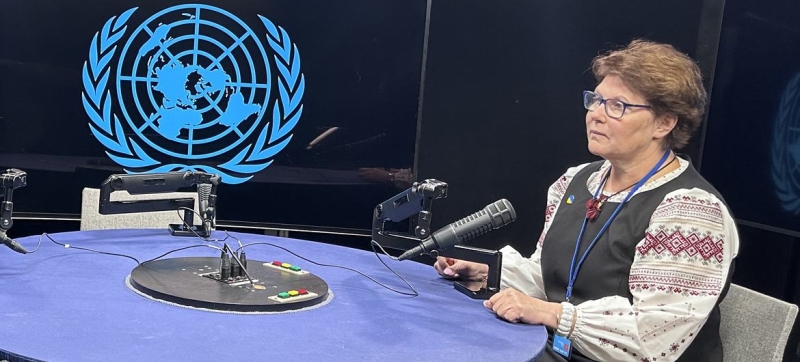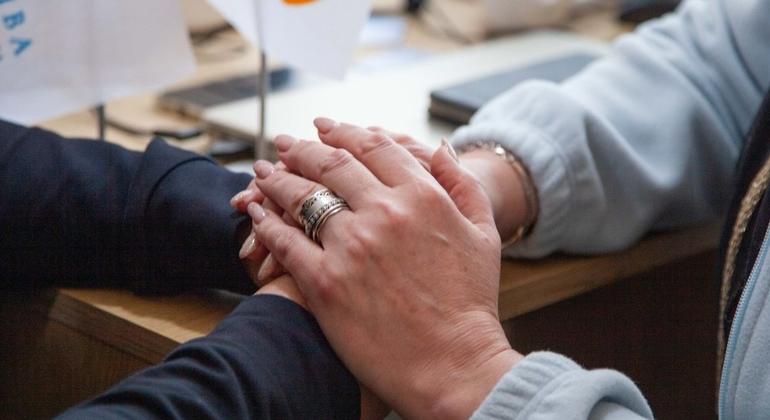
Kateryna Levchenko in the UN headquarters studio. INTERVIEW | UN helps Ukraine support victims of sexual violence in conflict Peace and security
The UN Human Rights Office monitoring mission has recorded numerous cases of sexual violence in the context of the war against Ukraine. Sexual violence was reported by 68 percent of Ukrainian servicemen interviewed by UN staff who had been in Russian captivity.
The Government of Ukraine, in cooperation with UN agencies, is developing and implementing programs to support women and men who have survived sexual violence in armed conflict. Kateryna Levchenko, human rights activist and the Government of Ukraine Commissioner for Gender Policy, told the UN News Service about this work.
UN News Service: When we talk about the rehabilitation of people who have suffered from sexual violence, we know that part of this rehabilitation is usually carried out by justice. How does the state support victims today, knowing that justice may have to wait for some time?
Katerina Levchenko: For us, for government agencies, it is very important that all work is carried out together with the victims – both women and men. Today we know only the tip of the iceberg. For example, law enforcement agencies have recorded about 350 confirmed facts. These facts concern both men and women. To date, about 50 cases have already been transferred to court. These are in absentia trials, when it is possible to identify the criminal among Russian military personnel. And such trials are held. That is, this is a very important process.
But when we talk about justice and fairness, it is not only about law enforcement, it is also about recognizing those who suffered. It is about providing the necessary assistance, to ensure satisfaction. This is also very important. And the inclusion of those who have experienced violence in the formation and implementation of policy at the national and local levels is also one of the ways of satisfaction.
Here I also want to say that a very important role in the formation of an effective and fairly prompt policy was played by the visit to Ukraine on May 3, 2022 of the Special Representative of the UN Secretary-General Pramila Patten and the signing of a special memorandum of cooperation between the Government of Ukraine and the UN system, which laid out the main areas of work, including rehabilitation, assistance, recognition of victims, work with them, work with government agencies, training, work with our military.

This memorandum served as the basis for our very active cooperation with many UN structures. These are the UN Population Fund, UN Women, the International Organization for Migration, the UN Development Program, UNICEF, the UN Refugee Agency and other structures. This program is relevant not only for the UN structures and the government, but also for all international and public organizations. The state created a special working group that is engaged in the development and implementation of policy, and our victims are part of it. The group participated in the development of a number of laws. For example, there was no definition of sexual violence in conflict in our legislation. Now the law has already passed the first reading, this is the so-called Bardina law, named after Marina Bardina, a people’s deputy who initiated this law. Dozens of specialists from various government agencies, public and international organizations worked on it.
We started a joint project with the UN, which is called UN Action and which coordinates the work of several UN agencies. What is important is that the interdepartmental group I mentioned has a consultative panel of victims. That is, when we talk about the need to make changes to a document that concerns victims, we hold consultations. We very persistently and systematically implement the principle of “nothing about us without us”.
The UN agencies, together with the government, developed an information campaign. This information campaign was done together with the victims – both men and women. We discussed which phrases are better, which images are better. That is, when we talk about developing policy, we are not talking about some lofty things… You know, we have such a sad joke in Ukraine. Why are the Russians attacking all our residential buildings, our apartments, and at the same time they say that they are attacking the decision-making centers? This is because the decision-making center is the apartment of every Ukrainian man and woman, that is why they are attacking them. That is, politics is not made only in high offices.
The Ukrainian ombudsman and the prosecutor’s office say that up to 90 percent of those who were in captivity suffered from torture and sexual violence
Russia’s war against Ukraine has brought completely new types of sexual violence. The Ukrainian ombudsman and the prosecutor’s office say that up to 90 percent of those who were in captivity suffered from torture and sexual violence. This means that they also need help as victims. The percentage of men who suffered is very high. The ages of the victims ranged from four to 82.
There is a lot of work, and it is difficult. Thanks to our partners. Rehabilitation programs for victims are a step towards helping people regain their strength. These programs should not be isolated. It is not that you just go through a rehabilitation program once and that’s it. The impact of sexual violence is very profound.
It is also very important for us that this voice is heard here at the UN, because the Secretary-General’s report on sexual violence in conflicts will be presented here and it will be possible to use the so-called “black list” of formations that commit sexual violence. Together with the victims, we are now lobbying for the data on victims that exists in Ukraine to be converted into the justice and accountability that you asked about at the beginning.
